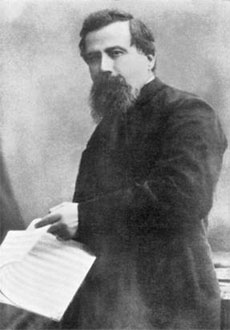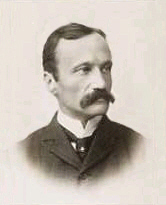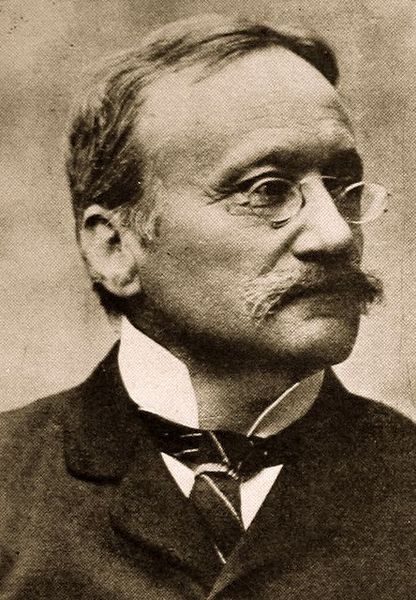<Back to Index>
- Composer Amilcare Ponchielli, 1834
- Composer Enrico Giuseppe Giovanni Boito, 1842
PAGE SPONSOR

Amilcare Ponchielli (August 31, 1834 – January 16, 1886) was an Italian composer, mainly of operas.
Born in Paderno Fasolaro, now Paderno Ponchielli, near Cremona, Ponchielli won a scholarship at the age of nine to study music at the Milan Conservatory, writing his first symphony by the time he was ten years old.
Two years after leaving the conservatory he wrote his first opera -- it was based on Alessandro Manzoni's great novel The Betrothed (I promessi sposi) -- and it was as an opera composer that he eventually found fame.
His early career was disappointing. Maneuvered out of a professorship at the Milan Conservatory that he had won in a competition, he took small time jobs in small cities, and composed several operas, none successful at first. In spite of his disappointment, he gained much experience as the bandmaster (capobanda) in Piacenza and Cremona, arranging and composing over 200 works for wind band. Notable among his "original" compositions for band are the first ever concerto for euphonium (Concerto per Flicornobasso, 1872), fifteen variations on the Neapolitan song "Carnevale di Venezia", and a series of festive and funeral marches that resound with the pride of the newly unified Italy and the private grief of his fellow Cremonese. The turning point was the big success of the revised version of I promessi sposi in 1872, which brought him a contract with the music publisher G. Ricordi & Co. and the musical establishment at the Conservatory and at La Scala. The ballet Le due gemelle (1873) confirmed his success.
The following opera, I Lituani (The Lithuanians) (1874), was also well received, being performed later at Saint Petersburg (as Aldona - November 20, 1884). His best known opera is La Gioconda, which his librettist Arrigo Boito adapted from the same play by Victor Hugo that had been previously set by Mercadante (Il giuramento, 1837) and Carlos Gomes (Fosca, 1873). It was first produced in 1876 and revised several times. The version that has become so popular today was first given in 1880.
In 1876 he started working on I mori di Valenza (the project dates back to 1873), an opera he never finished, although it was completed later by Arturo Cadore and performed posthumously in 1914.
After La Gioconda, Ponchielli wrote the monumental biblical melodrama in four acts Il figliuol prodigo (Milan, Teatro alla Scala, December 26, 1880) and Marion Delorme, from another play by Victor Hugo (Milan, Teatro alla Scala, March 17, 1885). In spite of their rich musical invention, neither of these operas met with the same success but both exerted great influence on the composers of the rising generation, like Giacomo Puccini, Pietro Mascagni and Umberto Giordano.
In 1881, Ponchielli was appointed maestro di cappella of the Bergamo Cathedral, and from the same year he was a professor of composition at the Milan Conservatory, where among his students were Puccini, Mascagni and Emilio Pizzi.
He died in Milan and was interred there in the Cimitero Monumentale.
Although in his lifetime Ponchielli was very popular and
influential, in introducing an enlarged orchestra and more
complex orchestration, the only one of his operas
regularly performed today is La Gioconda. It
contains the great tenor romanza "Cielo e mar", a superb duet
for tenor and baritone "Enzo Grimaldo",
the soprano set - piece "Suicidio!" and the ballet music
"The Dance of the Hours",
known even to the non - musical from its use in Walt Disney's Fantasia (1940), Alan Sherman's novelty song, "Hello Muddah, Hello
Fadduh", and other popular works.


Arrigo Boito (24 February 1842 – 10 June 1918), aka Enrico Giuseppe Giovanni Boito, pseudonym Tobia Gorrio, was an Italian poet, journalist, novelist and composer, best known today for his libretti, especially those for Giuseppe Verdi's operas Otello and Falstaff, and his own opera Mefistofele. Along with Emilio Praga, he is regarded as one of the prominent representatives of the Scapigliatura artistic movement.
Born in Padua, the son of Silvestro Boito, an Italian painter of miniatures and his wife, a Polish countess, Józefina Radolińska, Boito studied music at the Milan Conservatory with Alberto Mazzucato until 1861. In 1866 he fought under Giuseppe Garibaldi in the Seven Weeks War in which the Kingdom of Italy and Prussia fought against Austria, after which Venice was ceded to Italy.
His only finished opera, Mefistofele, based on Goethe's Faust, was given its first performance on 5 March 1868, at La Scala, Milan. The premiere, which he conducted himself, was badly received, provoking riots and duels over its supposed "Wagnerism", and it was closed by the police after two performances. Verdi commented, "He aspires to originality but succeeds only at being strange." Boito withdrew the opera from further performances to rework it, and it had a more successful second premiere, in Bologna on 10 April 1875. Boito's revised and drastically cut version also changed Faust from a baritone to a tenor, and it is still frequently performed and recorded today.
Other than Mefistofele, Boito wrote very little music. He completed (but later destroyed) another opera, Ero e Leandro, and left incomplete a further opera, Nerone, which he had been working at, on and off, between 1877 and 1915; excluding its last act, for which Boito left only a few sketches, Nerone was finished after his death by Arturo Toscanini and Vincenzo Tommasini and premiered at La Scala, 1924. Mefistofele is the only work of his performed with any regularity today. The Prologue to the opera, set in Heaven, is a favorite concert piece. Enrico Caruso included its two tenor arias in his first recording session. He also left a Symphony in A minor in manuscript.
Boito's literary powers never dried up. As well as writing the libretti for his own operas, he wrote them for other composers. As "Tobia Gorrio" (an anagram of his name) he provided the libretto for Amilcare Ponchielli's La Gioconda. His rapprochement with Verdi, whom he had offended in a toast shortly after they had collaborated on Verdi's Inno delle Nazioni ("Anthem of the Nations", London, 1862), was effected by the music publisher Giulio Ricordi. Boito successfully revised the libretto for Verdi's unwieldy Simon Boccanegra, which then premiered to great acclaim in 1881. With that, their mutual friendship and respect blossomed and, though Verdi's projection for an opera based on King Lear never came to anything, Boito provided subtle and resonant libretti for Verdi's last masterpieces, Otello (1887) and Falstaff (1893). When Verdi died, Boito was there at his bedside.
Boito succeeded Giovanni Bottesini as director of the Parma Conservatory after the latter's death in 1889 and held the post until 1897. He received the honorary degree of doctor of music from the University of Cambridge in 1893. He died in Milan and was interred there in the Cimitero Monumentale. He was an atheist.
A memorial concert was given in his honor at La Scala in 1948. The orchestra was conducted by Arturo Toscanini. Recorded in very primitive sound, the concert has been issued on CD.
Camillo Boito, Arrigo's older brother, was an Italian architect and engineer, and a noted art critic, art historian and novelist.